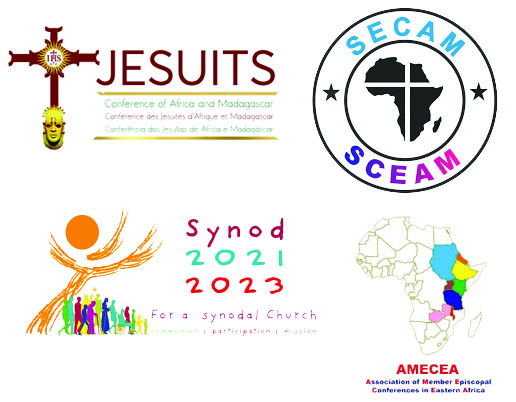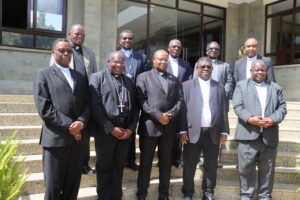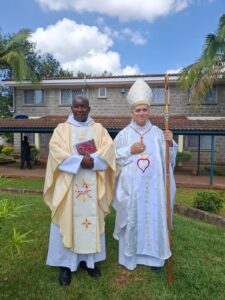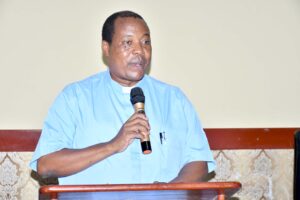AMECEA: African International Theological Colloquium on Synodality Proposes a Journey of Reform

Sr. Jecinter Antoinette Okoth, FSSA
Participants at a recent international colloquium which was organized under the African Synodal Initiative (ASI), propose a vision of synodality from their perspective as discernment of the Spirit, a fraternal collaboration and a journey towards reform on the basis of reading the signs of the times.
In a statement just released by ASI at JCAM in Nairobi and the shared with AMECEA Online Friday, May 6, the Colloquium members drawn from various African countries including Burkina Faso, Chad, Ghana, Ivory Coast, Kenya, Nigeria, Malawi, Rwanda, Senegal, South Africa and Tanzania gives an overview of synodality process “as a journey of reform rooted in reading the signs of the times, the Word of God, the Word in Church and in the world, a word that springs forth in the African church from creation, from our lives and culture, from the idea of Church as family of God.”
They emphasize that synodality is best understood by an “open and honest conversation, by genuinely valuing in word and deed the different charisms of all the people of God,” which applies to the “laity marginalized and patronized by excessive clericalism.”
In the collective statement from theologians, professionals, and academics both laity, Religious and clergy who attended the three- day colloquium from various institutions in Africa, they note that synodality, which recognizes and celebrates the charisms of all Christians, “is not simply a corrective to clericalism but the way in which we can truly be Church.”
“It (synodality) breaks down rigidity and creates a culture of listening to the voice of the Spirit that forms us all for the mission of the Church: integral evangelization of peoples and cultures, particularly our diverse African cultures, as well as new worlds to be evangelized, education, health, technology, politics, economy, and the Church itself,” reads an excerpt of the statement.
“This is the work of clergy and laity, theologians and bishops working and walking together as members of the family of God (as) we are all learners and teachers; laity and clergy evangelize one another as we evangelize the world,” the statement continues.
The African Synodality Initiative (ASI) is a partnership of the Association of Member Episcopal Conferences in Eastern Africa (AMECEA), the Symposium of the Episcopal Conferences of Africa and Madagascar (SECAM) the Jesuit Conference of Africa and Madagascar (JCAM).
At the opening of the colloquium, the Secretariat of the Synod of Bishops underscored that as Africans, synodality needs to embrace the African values, hence the participants observation that “Our contribution to the Synod on Synodality must include our African cultural values expressed in terms like Ubuntu, Ujamaa, Baraza and Palaver among others, reverential dialogue that is inspired by the family spirit and related to nature, our ancestors, and the desired future for Africa.”
The participants further revealed that the synodal process has been marked by fear and resistance in some people but in their view, the anxiety is “often rooted in the view that change may destroy the Church.”
“This is counter-productive; institutional self-preservation, while a natural concern, can be detrimental where so much of what we have is dysfunctional or simply does not contribute as well as it could to the Church’s mission,” participants at the international colloquium expressed.
Through genuine listening, a skill encouraged during the synodal process, the colloquium statement notices that the fear in responding faithfully to the expectations of the synod is from both the laity and the clergy.
“The clergy are hesitant to embrace change for fear of the unknown and how that will affect the position of the Church and its leaders,” reads the collective statement and continues, “Some laity have expressed fear and reluctance questioning whether their opinions will be taken seriously. In some places, the insufficient creation of awareness of synodality and what it stands for affects participation as does a distorted conception of synodal engagement and its overarching depths.”
In conclusion the they appeal that synodality should not end with the Synod in 2023 but rather must be an “ongoing, long-term pedagogy and way of life of the Church.”
“By building openness and systems of trust, by changing a mentality of rigidity and building a culture of listening that is open to suggestions and critiques, we believe that we can truly become a Spirit-filled Church, a living witness to Christ at the service of the marginalized and excluded in Africa and the world, and a place that welcomes all God’s people,” reads part of the statement.


